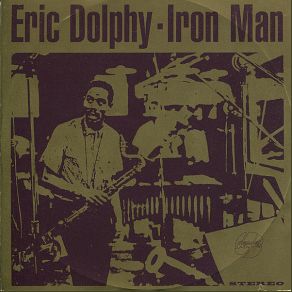Iron Man
Download links and information about Iron Man by Eric Dolphy. This album was released in 1963 and it belongs to Jazz, Avant Garde Jazz genres. It contains 5 tracks with total duration of 40:45 minutes.

|
|
|---|---|
| Artist: | Eric Dolphy |
| Release date: | 1963 |
| Genre: | Jazz, Avant Garde Jazz |
| Tracks: | 5 |
| Duration: | 40:45 |
| Buy it NOW at: | |
| Buy on iTunes $9.99 | |
| Buy on iTunes $9.99 | |
| Buy on iTunes $6.99 | |
| Buy on iTunes $9.99 | |
| Buy on Amazon $7.99 | |
| Buy on Amazon $7.59 | |
| Buy on Amazon $5.49 | |
| Buy on Amazon $20.62 | |
| Buy on Amazon $25.16 | |
| Buy on Amazon $69.99 | |
| Buy on iTunes $9.99 | |
Tracks
[Edit]| No. | Title | Length |
|---|---|---|
| 1. | Iron Man | 9:13 |
| 2. | Mandrake | 4:50 |
| 3. | Come Sunday | 6:30 |
| 4. | Burning Spear | 11:59 |
| 5. | Ode to C.P. | 8:13 |
Details
[Edit]The companion piece to Conversations (recorded at the same mid-1963 sessions with producer Alan Douglas), Iron Man is every bit as essential and strikes a more consistent ambience than its widely varied twin. It also more clearly anticipates the detailed, abstract sound paintings of Dolphy's masterwork Out to Lunch, in large part because this time around the program is weighted toward Dolphy originals. "Iron Man," "Burning Spear," and the shorter "Mandrake" all have pretty outside themes, full of Dolphy's trademark wide interval leaps and playful sense of dissonance. Yet there's enough structure and swing to make their roots in hard bop perfectly clear, and once the front-line horns blast out the themes, the ensemble shifts into a more cerebral, exploratory mode. In the absence of a piano, Bobby Hutcherson's vibes are a crucial anchor, outlining dissonant harmonies that hang in the air almost spectrally behind the rest of the group. Most of the same musicians from Conversations appear here, including trumpeter Woody Shaw, flutist Prince Lasha, altoist Sonny Simmons, and soprano sax player Clifford Jordan. And once again, Dolphy duets with bassist Richard Davis, twice this time — on bass clarinet for Ellington's "Come Sunday" and on flute for Jaki Byard's "Ode to C.P." Both are lovely, meditative pieces filled with conversational exchanges between the two players, illustrating what similar wavelengths they were on. Between Conversations and Iron Man, split up the way they are, one has to give a slight edge to the latter for its more cohesive presentation, yet these are classic sessions in any form and constitute some of the most brilliant work of the early-'60s avant-garde.